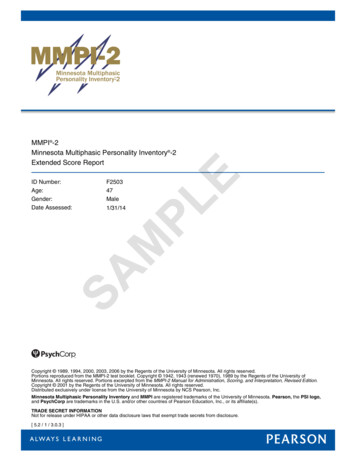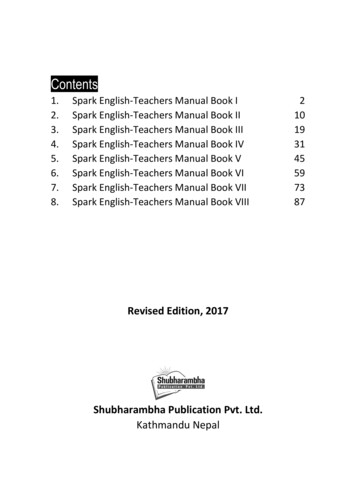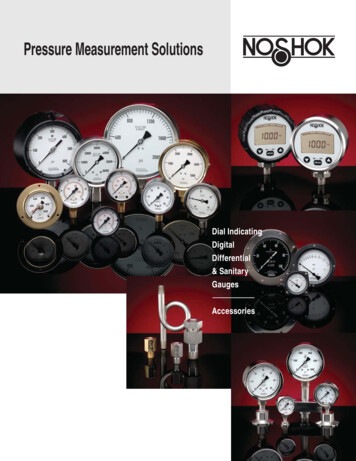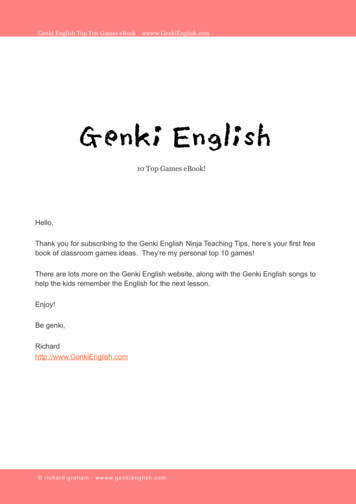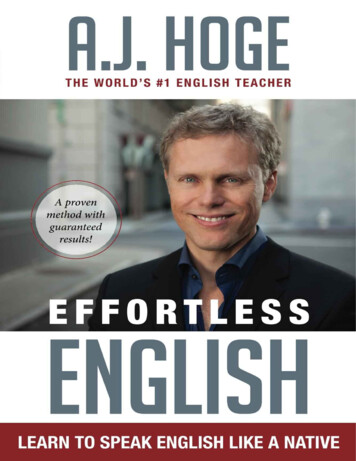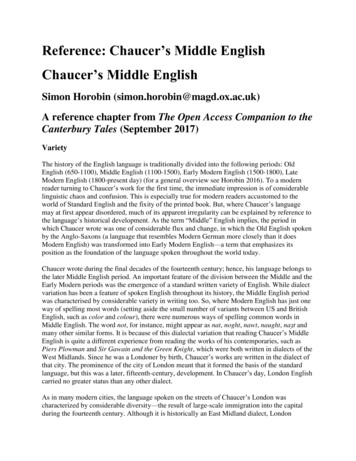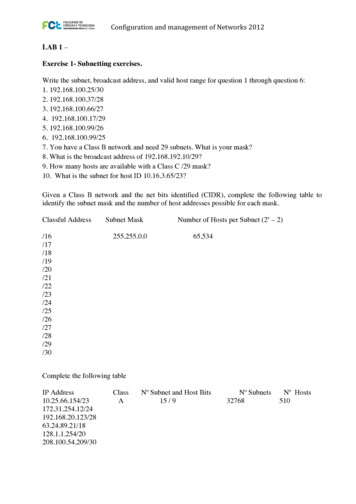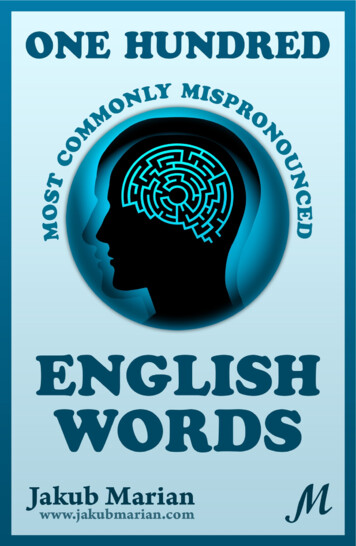
Transcription
One HundredMost CommonlyMispronouncedEnglish WordsbyJakub MarianSecond Edition, March 2015The PDF version has no associated ISBNThe image of the head on the front cover is copyrighted byAndrey Ospishchev and licensed from fotolia.com.
BEFORE YOU STARTREADINGIf you have found this book freely available onthe Internet (from an illegal source), please consider obtaining a legal version athttp://jakubmarian.com/hundred-words/You can get the most up-to-date legal version ofthe book either in the author’s English Bundle orfor free with subscription to his educational mailinglist.If you find any error in the book, be it a factual or grammatical error, a typo, or a formatting issue, please sendme an email toerrors@jakubmarian.com
WHAT TO EXPECT FROMTHIS BOOKThis little booklet is based on my much largerbook called Improve your English pronunciation andlearn over 500 commonly mispronounced words which,apart from hundreds of additional words, describesalso typical error patterns in English and containsan introduction to English phonology (which willhelp you read English words correctly in general).I have selected 100 words from the original bookthat I consider to be the most important ones andcompiled them here in alphabetical order so thatmy readers can easily review them. This book alsoutilizes a smaller page size and is better suited forreading on e-book reading devices.Pronunciation is denoted using a simplified version of IPA (International Phonetic Alphabet; thenotation used in the aforementioned book is a bitmore sophisticated). If you can’t read IPA yet, don’tworry; pronunciation is written also in a pseudoEnglish notation which will be explained beforeyou start reading the list. If you want to learn moreabout the IPA, there is an appendix explaining all IPAsymbols at the very end of the book.
TABLE OF CONTENTSBefore you start reading . 3What to expect from this book . 4The notation . 6The list . 8Appendix: IPA . 32Vowels . 33Consonants . 37Alphabetical Index . 44
THE NOTATIONIn order to be able to read the pseudo-Englishnotation used here, you will have to remember justthree IPA characters; the rest should be pronouncedas you would intuitively pronounce it as an Englishword. The characters you have to remember are:[ə] is pronounced as “a” in “a book” (i.e. as the indefinite article). It is a neutral sound, as if you werejust releasing air through your vocal chords. If yousometimes think that there’s an “ə” used in a placewhere you would expect “i” as in “pit” (or conversely), don’t worry; these two sounds are ofteninterchangeable.[æ] is a sound approximately between “a” in“father” and “e” in “bed”. The symbol is used toremind you that English “a” (as in “cat” “kæt”,“bad” “bæd”, “sad” “sæd” etc.) is pronouncedsomewhat differently than you are used from yourmother tongue.[ʌ] is the sound of “u” in “but” (bʌt) and “o” in“come” (kʌm).There are also a few groups of letters used consistently in the pseudo-English notation, but don’tworry about them too much; you will rememberthem naturally as you start reading the list and if
7100 COMMONLY MISPRONOUNCED WORDSyou skip to the next section right now, you will probablydo just fine.In case you are interested: “aw” is pronouncedas in “law”, “oo” as in “cool”, “oo” (italicised) as in“good” (the same as “u” in “put”), “ ee” (italicised)is used to denote the same sound as in “see” butshort, and “oh” is used to denote [oʊ] which is howAmericans pronounce “oh”; in British English,“oh” is pronounced as “əu”.The pseudo-English notation uses dashes to divide each word into simpler parts, for example “police” “pə-lees”. The stressed part is bold. Theseparts often correspond to the syllables of the word,but they do not if this could lead to a wrong pronunciation, so don’t pronounce the dashes as anykind of pause. For example “recipe” is denoted as“res-ip-ee”, although the syllables are in fact “res-ipee”, but this would mislead some people to pronounce the “i” as “aay”.If the American pronunciation differs from theBritish one, the one just explained is marked by thesymbol UK or US after the given pronunciation.
THE LISTThere is not much more to say; I hope you will enjoythe process of reading and learning something new.ability [əˈbɪləti] (ə-bil-ə-tee); even though an abilityis something you are able [ˈeɪbl] (ey-bl) to do,there’s no “ey” at the beginning of “ability”.albeit [ɔ:lˈbi:ɪt] (aw’l-bee-it); this fairly formal word,meaning “although”, is not used much inspeech, but is still quite common in literature.Once you remember that it is actually a combination of three words “all be it”, you will nolonger have any problem with its correct pronunciation.alien [ˈeɪliən] (ei-li-ən); a lion would certainly be anunwelcome alien at your home, but don’t pronounce them the same. Just remember that analien is not your ally [ˈælaɪ] (æ-laay).angel [ˈeɪndʒəl] (eyn-dzhəl); unlike many otherwords beginning with “ang-”, “angel” is pronounced with [eɪndʒ] (eyndzh) at the beginning.Nevertheless, a derived word angelic [æn
9100 COMMONLY MISPRONOUNCED WORDSˈdʒelɪk] (æn-dzhe-lik) is stressed on the secondsyllable and the vowels are pronounced differently.Arkansas [ˈɑ:kənˌsɔ:] (aak-ən-saw) UK, [ˈɑ:rkənˌsɔ:](aark-ən-saw) US; the name of one of the USstates sounds like a symbol for a new religiousmovement: “ark and saw”. However, this is howit is really pronounced.ballet [ˈbæleɪ] (bæ-lei) UK, [bæˈleɪ] (bæ-lei) US;somewhat surprisingly, the final “t” remains silent in English.beige [beɪʒ] (beyzh); this word is of French originand inherits its French pronunciation. The “g” ispronounced the same as in “massage”.bomb [bom] (bom) UK, [bɑ:m] (baam) US; the “b” in“mb” in English is usually silent. This word isperhaps even more confusing than the others inthat it also exists in most other languages in thesame written form but with the “b” pronounced.The same pronunciation is used also for bombing [ˈbomɪŋ] (bom-ing) UK, [ˈbɑ:mɪŋ] (baam-ing)US.
THE LIST10bull [bʊl] (bool, with short “u”); some people pronounce the “u” wrongly as [ʌ], as in “cut”, but itis the same “u” as in “put”.bullet [ˈbʊlɪt] (boo-lit, with short “u”); as in the previous case, “u” is pronounced as [ʊ] (oo).bury [ˈberi] (ber-ri); a burial [ˈberiəl] (ber-ri-əl) is asad and important event. Don’t spoil it by pronouncing it wrong. It is pronounced exactly thesame as “berry” (i.e. there is no “uh” or “ ʌ”sound).caffeine [ˈkæfi:n] (kæ-feen) is, after all, in coffee, soit would be more logical to call it “coffeen”,wouldn’t it? As a compromise between the two,at least “ei” is pronounced as “ee”.calm [kɑ:m] (kaam); English doesn’t seem to likethe combination “alm”, so the “l” remains silentin most dialects (however, there are some American ones in which it is pronounced).change [tʃeɪndʒ] (tcheyndzh); the word is pronounced with “ey”, not with “æ” or “e”.
11100 COMMONLY MISPRONOUNCED WORDSchaos [ˈkeɪos] (kei-oss)UK,[ˈkheɪɑ:s] (kei-aas) US;the pronunciation of this word is actually quiteregular, but people tend to pronounce it as thesame word in their own language, which usuallydiffers from its English pronunciation.chic [ʃi:k] (sheek); what is chic is fashionable or elegant. The word is borrowed from French andretains the original pronunciation.climb [klaɪm] (klaaym); as in “bomb”, the “b” in“mb” is silent. This is true also for “climbing”[ˈklaɪmɪŋ] (klaay-ming), “climbed” [ˈklaɪmd](klaaymd), and “climber” [ˈklaɪmə] (klaay-mə) UK,[ˈklaɪmər] (klaay-mr) US.colonel [ˈkə:nl] (kə’ə-nl) UK, [ˈkərnl] (kər-nl) US; isthere a kernel inside a colonel (a military officer)? Well, at least in pronunciation, there is(they are pronounced the same).column [ˈkoləm] (koll-əm) UK, [ˈkɑ:ləm] (kaal-əm)US; whether it is a column of text or a column inarchitecture, the pronunciation still retains someinfluence of its French origin. It is not [ʌ] as in“colour”, and there is also no [ ju:] (yoo) as involume.
THE LIST12comb [kəʊm] (kəum) UK, [koʊm] (koh’m) US; thetoothed device used for styling hair is pronounced without the “b” at the end. Remember:the “m” already looks like a comb, so no “b” isneeded.comfortable [ˈkʌmfətəbl] (kʌm-fə-tə-bl) UK, in theUS also [ˈkʌmftəbl] (kʌm-ftə-bl); if you “come for atable” to a furniture shop, it will hopefully becomfortable, although it doesn’t rhyme with it.company [ˈkʌmpəni] (kʌm-pə-nee); a company is agroup of people who in a sense “come” together,and the “com” in “company” is pronounced exactly the same as in “come”. The same is true foraccompany [əˈkʌmpəni] (ə-kʌm-pə-nee).(of) course [kɔ:s] (kaw’s) UK, [kɔ:rs] (kaw’rs) or[koʊrs] (koh’rs) US; although the word is ofFrench origin, the “ou” is not pronounced as [u:](oo) as is common in French words.court [kɔ:t] (kaw’t) [kɔ:rt] (kaw’rt); hopefully youwill never have to deal with a court, but if youdo, remember to pronounce it with “aw”, notwith “oo”.
13100 COMMONLY MISPRONOUNCED WORDScupboard [ˈkʌbəd] (kʌ-bəd) UK, [ˈkʌbərd] (kʌ-brd) USis indeed derived from the words “cup” and“board”; nonetheless, the “board” in it is pronounced with [ə] and “p” is not pronounced atall.debris [ˈdebri:] (deb-ree) UK, [dəˈbri:] (də-bree) US;this word retained its original French pronunciation, so the final “s” is silent.debt [det] (det); a word that has become abundantin media after the recent financial crisis[ˈkraɪsɪs] (kraay-sis). If you pronounce the “b”,people will likely understand it as “dipped”.despicable [dɪˈspɪkəbl] (dis-pik-ə-bl), rarely also[ˈdespɪkəbl] (des-pik-ə-bl); when you despise [dɪˈspaɪz] (dis-paayz) something, you find it“despicable”, which is pronounced with [k] forsome reason. The word “despisable” [dɪˈspaɪzəbl] (dis-paay-zə-bl) (spelled with an “s”)theoretically exists in some dictionaries, but noone really uses it in practice.dessert [dɪˈzə:t] (di-zə’ət), [dɪˈzərt] (di-zərt) is asweet course that concludes the meal. Don’t con-
THE LIST14fuse it with desert [ˈdezət] (de-zət) UK, [ˈdezərt](de-zrt) US which is a large area of dry land.dove [dʌv] (dʌv); the bird of the pigeon family is often used as a symbol of love, perhaps becausethe words are so similar. However, the word“dove” is becoming increasingly widespread asthe past tense of “dive” (whose standard form is“dived”), and in this sense it is pronounced[dəʊv] (dəuv) UK, [doʊv] (doh’v) US.Edinburgh [ˈedɪnbərə] (ed-in-bə-rə) or [ˈedɪnbrə](ed-in-brə) UK, [ˈedənbʌrə] (ed-ən-bʌ-rə) or[ˈedənbərə] (ed-ən-bə-rə) US; the name of thecapital of Scotland is known well enough to slipinto many other languages in an almost unchanged written form, but its correct counter-intuitive pronunciation is usually known only tonative speakers.elite [ɪˈli:t] (ih-leet), sometimes also [eɪˈli:t] (ey-leet);elite people are certainly not a “lite version” ofthe population. Don’t rhyme them with it.epitome [ɪˈpɪtəmi] (ih-pit-ə-mee); this somewhatless common word means “someone who is aprototypical example of a class of people”. Al-
15100 COMMONLY MISPRONOUNCED WORDSthough you could fill a tome with a list of epitomes, you cannot rhyme it with them.exercise [ˈeksəsaɪz] (ek-sə-saayz) UK, [ˈeksərsaɪz](ek-sr-saayz) US; many doctors will discourageyou from eating too many eggs if you want tolead a healthy lifestyle. Whether they are right ornot is a matter of discussion, but one thing is forsure: don’t mix eggs and (the word) “exercise”;after all, it’s “exercise” not “eggsercise”.finale [fɪˈnɑ:li] (fin-aa-lee) UK, [fɪˈnæli] (fin-æ-lee) USis the last part of a show or a piece of music.And the only English word in which “ale” at theend is pronounced with “lee”.front [frʌnt] (frʌnt); is pronounced with [ʌ], i.e.“ron” in it doesn’t sound like the name “Ron”.The same is true for “confront” [kənˈfrʌnt] (kənfrʌnt).fruit [fru:t] (froot); simply ignore the “i”. The wordis pronounced exactly as if it were written“froot”.
THE LIST16fuchsia [ˈfju:ʃə] (fyoo-shə) is a small bush withflowers of a characteristic colour which is alsoreferred to as “fuchsia“.garage is pronounced in the UK either as [ˈgærɑ:ʒ](gæ-raazh) or [ˈgærɪdʒ] (gæ-ridzh), in the US it isusually [gəˈrɑ:ʒ] (gə-raazh).gauge [geɪdʒ] (geydzh); this word is especially useful to guitarists who speak about string gauges(i.e. how thick they are). It is pronounced as ifthe “u” were not there.genre [ˈʒonrə] (zhon-rə) UK, [ˈʒɑ:nər] (zhaa-nr) US; avery French word indeed. It is even pronouncedwith a nasal vowel in some variations of BritishEnglish, i.e. with squeezing of the back of one’sthroat instead of saying [n].Greenwich [ˈgrenɪtʃ] (gren-itch) or [ˈgrɪnɪdʒ] (grinidzh); you probably know this word from theGreenwich Mean Time (GMT) standard. Just remember that there is no green witch in Greenwich.grind [graɪnd] (graaynd); there are only 4 Englishwords that end with “rind”: rind, grind, regrind,
17100 COMMONLY MISPRONOUNCED WORDSand tamarind. Tamarind is a tree, and it is theonly one of those in which “rind” is pronouncedas one would expect: [rind]. In the other three, itis pronounced as [raɪnd] (raaynd). (“Rind” is theouter skin of some types of fruit, for example“lemon rind”.)height [haɪt] (haayt); the pronunciation is as if itwere written “hight”. The “e” is there just toconfuse foreigners.heir [eə] (eə) UK, [er] (er) US; a person who inheritssomething from someone else. It comes fromOld French, so the “h” remains silent; it soundsexactly the same as “air” and “ere” (meaning“before long”).hotel [həʊˈtel] (həu-tel) UK, [hoʊˈtel] (hoh-tel) US;“ho ho ho, tell me why you are not at home” issomething Santa Claus could ask you if youstayed in a hotel over Christmas. It is most certainly not the reason why it is called “hotel”, butit will hopefully help you remember that thestress is actually on the second syllable (there isnot [tl] at the end).
THE LIST18hour [ˈaʊə] (aau-ə) UK, [ˈaʊər] (aau-rr) US (both thesame as “our”); the “h” at the beginning is silent,as it should be also in the name of the letter H[eɪdʒ] (eydzh). Some native speakers started topronounce H as “heydzh” lately, but such pronunciation is regarded as uneducated by many.houses [ˈhaʊzɪz] (haauziz); the singular form,house, is pronounced with [s] at the end: [ haʊs](haaus). The plural of it, however, is pronouncedwith [z].hyperbole [haɪˈpə:bəli] (haay-pə’ə-bə-lee) UK, [haɪˈpərbəli] US (haay-pər-bə-lee); don’t confuse thisword with a hyperbola, a geometric shape. Hyperbole is a form of exaggeration, and it doesn’trhyme with a bowl.infamous [ˈɪnfəməs] (in-fə-məs); although theword is just “famous” with the prefix “in-” stuckin the front, it is not pronounced so.Ireland [ˈaɪələnd] (aay-ə-lənd) UK, [ˈaɪərlənd] (aay-rlənd) US; ironically, “ire”, pronounced [ˈaɪə](aay-ə) UK, [ˈaɪər] (aay-r) US, is a word meaning“anger” or “wrath”. However, the “Ire” in “Ire-
19100 COMMONLY MISPRONOUNCED WORDSland” comes from “Ériu”, a mythological Irishbeing.iron [ˈaɪən] (aay-ən) UK, [ˈaɪərn] (aay-rn) US; thisword is mispronounced by almost 100% of beginning English learners who pronounce it asaay-rən or aay-ron, but none of these pronunciations is correct. The same is true also for“ironed” [ˈaɪənd] (aay-ənd) UK, [ˈaɪərnd] (aayrn’d) US and “ironing” [ˈaɪənɪŋ] (aay-ə-ning) UK,[ˈaɪərnɪŋ] (aay-ər-ning) US.island [ˈaɪlənd] (aay-lənd) was written “iland” before the 16th century. Although island indeed island surrounded by water, the word is not written so because it “is land”, but because there isan etymologically unrelated word isle [aɪl] (pronounced the same as “I’ll”) which also means“island”, and so people during the 16 th centurythought it would be fun to insert “s” into thespelling of “iland” as well.laugh [lɑ:f] (laaf) UK, [læf] (læf) US; the letter combination “augh” is usually pronounced [ɔ:] (aw),as in “taught”, “caught”, “naught”, but not here.
THE LIST20launch [lɔ:ntʃ] (law’ntch); as in most English words,“au” here is pronounced as [ɔ:] (aw). Don’t confuse the word with lunch [lʌntʃ] (lʌntch); youcan launch a rocket [ˈrokɪt] (rokk-it) UK, [ˈrɑ:kɪt](raa-kit) US and you can have a lunch with yourfriends, but hopefully not otherwise.lettuce [ˈletɪs] (let-is) UK, [ˈleɾɪs] (led-is) US; remember that lettuce doesn’t grow on a spruce; and italso doesn’t rhyme with it.lieutenant [lefˈtenənt] UK (lef-te-nənt), [lu:ˈtenənt] US(loo-te-nənt); the American pronunciation posesno problem here; just notice the British one.lingerie [ˈlænʒəri] (læn-zhə-ree) UK, [ˌlɑ:n(d)ʒəˈreɪ](laan-(d)zhə-rei) or [ˈlɑn(d)ʒəri] (laan-(d)zhə-ree)US; in British English, pronunciation of this wordremains close to the original French one; thereare several other options in American English.lozenge [ˈlozɪndʒ] (lozz-indzh) UK, [ˈlɑ:zɪndʒ] (laazindzh) US; a diamond-like figure: . The last “e”is silent and there is no “oh” in it.maple [ˈmeɪpl] (mei-pl); you can make a map (mæp)out of its wood, you can eat an apple (æ-pl) with
21100 COMMONLY MISPRONOUNCED WORDSits syrup, but don’t pronounce it with [ æ]. Bythe way, the word “syrup” is pronounced[ˈsɪrəp] (si-rəp), not “saay-rəp”.margarine [ˌmɑ:dʒəˈri:n] (maa-dzhə-reen) UK,[ˈmɑ:rdʒərɪn] (maar-dzhə-rin) US; in most dialects,the “g” is pronounced as [dʒ] (dzh) (perhaps itwill help you to remember that margarine is alsocolloquially called “marge” [mɑ:dʒ] (maadzh) inthe UK). Also notice the difference in stress position between American and British English.miscellaneous [ˌmɪsəˈleɪniəs] (mis-ə-lei-nee-əs);learners make miscellaneous mistakes; even theword “miscellaneous” is often one of them.mischief [ˈmɪstʃɪf] (mis-tchif); mischief is a bad behaviour which does not cause serious harm.Don’t pronounce it with “k”. The adjective derived from it is mischievous [ˈmɪstʃɪvəs] (mistchiv-əs);mishap [ˈmɪshæp] (mis-hæp); the word is mis-hap,meaning mis-happiness, i.e. misfortune or badluck.
THE LIST22mortgage [ˈmɔ:gɪdʒ] (maw-gidzh) UK, [ˈmɔ:rgɪdʒ](maw’r-gidzh) US; the “t” is silent, as it should bein the name of Lord Voldemort according toJ.K.Rowling (although most Muggles who daresay the name pronounce the final t).niche [ni:ʃ] (neesh)UK,[nɪtʃ] (nitch) US; this word,originally meaning a shallow recess or simply anice place or position, is also often used to meana particular narrow field of interest (especially inbusiness). Its pronunciation can be somewhatunexpected.oasis [əʊˈeɪsɪs] (əu-ey-sis) UK, [oʊˈeɪsɪs] (oh-ey-sis)US; imagine you are on a desert with a friendnamed Asis and you are almost dying of thirst.When you cannot go any further, you say “oh,Asis.” after which your friend starts runningforward in a burst of happiness. To solve thepuzzle, find out why. The plural of “oasis” is“oases” [əʊˈeɪsi:z] (əu-ey-seez) UK, [oʊˈeɪsi:z](oh-ey-seez) US.onion [ˈʌnjən] (ʌn-yən); one of a couple of words inwhich “o” is pronounced as [ʌ] (as in “come”).
23100 COMMONLY MISPRONOUNCED WORDSowe [əʊ] (əu) UK, [oʊ] (oh) US; if you remember thatthe phrase “I owe you” is often abbreviated IOU,it will help you remember that this word is pronounced just as the letter “o”. The abbreviationhas even become a noun meaning “a writtenpromise to pay a debt” (you can give someone“an IOU”).owl [aʊl] (aaul); it may be a silly way, but if you remember that an owl looks like ʌ(OO)ʌ, it willperhaps help you remember that it is pronounced with something close to “ʌoo”.photograph [ˈfəʊtəgrɑ:f] (fəu-tə-graaf) UK, [ˈfoʊtəgræf] (foh-tə-græf) US; the word is synonymousto a photo; it is not the person who takes thephoto as in many other languages. The person isa photographer [fəˈtogrəfə] (fə-togg-rə-fə) UK,[fəˈtɑ:grəfər] (fə-taag-rə-fr) US; notice that thestress is now on the second syllable, whereas itwas on the first syllable in “photograph”. Tomake the confusion complete, the stress in theword photographic [ˌfəʊtəˈgræfɪk] (fəu-tə-græfik) UK, [ˌfoʊtəˈgræfɪk] (foh-tə-græf-ik) US is on thethird syllable.
THE LIST24pour [pɔ:] (paw) UK, [pɔ:r] (paw’r) or [poʊr] (poh’r)US; although the word looks like having a Frenchorigin and “ou” in French words is usually pronounced [u:], e.g. route [ru:t] (root), in this casethe origin is not French, and so is not the pronunciation. On the other hand, the word “poor”can be pronounced either with [ ʊ] (oo) or with[ɔ:] (aw) (both are equally valid). If you use theformer, you can remember not to use the “poor”pronunciation for “pour”.pudding [ˈpʊdɪŋ] (poo-ding, with short “u” ); if youdrop a bowl of pudding, it forms a puddle [pʌdl],but when it is still in the bowl, it is, well, with“poo”.purchase [ˈpə:tʃəs] (pə’ə-tchəs) UK, [ˈpərtʃəs] (pərtchəs) US; it is true that many people literally“chase discounts” when purchasing goods, butthere is no “chase” in the pronunciation of “purchase”.pyramid [ˈpɪrəmɪd] (pir-ə-mid); the “pyr” in theword “pyramid” has nothing to do with the prefix “pyro-” which comes from Greek and is usedin the word pyromania [ˌpaɪrəʊˈmeɪniə] (paay-
25100 COMMONLY MISPRONOUNCED WORDSrəu-mei-nee-ə)mei-nee-ə) US.UK,[ˌpaɪroʊˈmeɪniə] (paay-roh-queue [kju:] (kyoo); if you want to pronounce thisword correctly, just think of the Q at the beginning; “ueue” is not pronounced at all.recipe [ˈresɪpi] (res-ip-ee); “cipe” in this casedoesn’t rhyme with “ripe”; it consists of two separate syllables.salmon [ˈsæmən] (sæ-mən); there’s somethingfishy about this word. Perhaps the pronunciation.sandwich [ˈsænwɪtʃ] (sæn-witch) or [ˈsænwɪdʒ](sæn-widzh); would you like to eat a sandwichwith sand? If you wouldn’t, don’t pronounce the“d”.schedule [ˈʃedju:l] (shed-yool) UK, [ˈskedʒu:l](skedzh-ool) US; I am not sure which of the twovariants is more confusing. Anyway, if you learna certain dialect, you should stick to the pronunciation used in that dialect.
THE LIST26schizophrenia [ˌskɪtsəˈfri:niə] (skits-ə-free-ni-ə); aGerman heart will skip a beat when seeing thisword; not just because schizophrenia was originally described and researched by German scientists, but also because its pronunciation resembles to a certain degree the original Germanone. It is one of very few English words containing the “ts” sound where “t” and “s” are pronounced almost simultaneously.since [sɪns] (sins); some people, misled by the “e”at the end, pronounce this word as “saayns”.subtle [ˈsʌtl] (sʌ-tl) UK, [ˈsʌɾl] (sʌ-dl) US; “btle”simply doesn’t sound good. Don’t pronounce the“b”.suit [su:t] (soot), in the UK also [sju:t] (syoot); as inthe case of “fruit”, the “i” is silent.suite [swi:t] (sweet); meaning a set of rooms (in ahotel), a set of matching pieces of furniture, acertain type of musical composition, or a set ofrelated computer programs, this word is pronounced exactly the same as “sweet”.
27100 COMMONLY MISPRONOUNCED WORDSsurface [ˈsə:fɪs] (sə’ə-fis) [ˈsərfɪs] (sər-fis); you canwipe your face using the surface of your towel,but you cannot rhyme it with it.sweat [swet] (swet); have you ever tasted sweat?It’s not exactly sweet. Don’t pronounce it thisway.sword [sɔ:d] (saw’d) UK, [sɔ:rd] (saw’rd) US; the“w” is silent, and the word is pronounced as if itwere written “sord”. However, it is not true thatin “sw” the “w” would always be silent; for example “swan” is pronounced [swon] (swonn)UK, [swɑ:n] (swaan) US.target [ˈtɑ:gɪt] (taag-it) UK, [ˈtɑ:rgɪt] (taarg-it) US; itwould certainly be possible to “get some tar” inorder to mark a target. Although “target” is etymologically related neither to “tar” nor to “get”,it is a way to remember that the “g” is as in“get”, not as “j” in “jet”.tear; this word may cause some confusion, becauseit has two completely unrelated meanings. Whenit denotes a water drop coming out of someone’seye, it’s pronounced [tɪə] (ti’ə) UK or [tɪr] US (tir).When it denotes the process of “ripping” some-
THE LIST28thing, it is pronounced [teə] (teə) UK or [ter] (ter)US.ton [tʌn] (tʌn); don’t let your mother tongue mislead you; there is really an [ʌ], and so is in “son”and “won”. What may be even more confusingthan the pronunciation is the fact that “ton”refers to the unit used in the US that is definedas 1 ton 2,000 pounds 907 kg. It can also referto the ton used in the UK where 1 ton 2,240pounds 1,016 kg, but which is no longer officially used (since 1985). If you want to refer tothe so called “metric ton”, the word you arelooking for is pronounced the same but isspelled “tonne”, i.e. 1 tonne 1000 kg.vegan [ˈvi:gən] (vee-gən); the city of Las Vegas[ˈlɑ:s ˈveɪgəs] (laas vei-gəs) is considered to be aplace of indulgence—a quality despised by vegans. Don’t pronounce the “veg” in the twowords the same.village [ˈvɪlɪdʒ] (vil-idzh); it is not called so becauseits inhabitants are of higher age on average; infact, there is no connection between the words“village” and “age” whatsoever, and there is alsonone in the pronunciation. The same applies to a
29100 COMMONLY MISPRONOUNCED WORDSvillager [ˈvɪlɪdʒə] (vil-idzh-ə)idzh-rr) US.UK,[ˈvɪlɪdʒər] (vil-vinegar [ˈvɪnɪgə] (vin-ig-ə) UK, [ˈvɪnɪgər] (vin-ig-rr)US is used to make food more sour [ˈsaʊə](saau-ə) UK, [ˈsaʊər] (saau-rr) US. Although theword is related to vine [vaɪn] (vaayn), it is notpronounced so. And when we are at it, don’tconfuse pronunciation of “vine” and “wine”; a“vine” is a plant on which grapes grow and ispronounced with “v” at the beginning (as in“very”), and “wine” is the liquid you can makeout of the grapes and is pronounced with “w” atthe beginning (as in “wow”).pear [peə] (peə) UK, [per] (per) US; the fruit, as wellas bear, the animal, and wear—all of them arepronounced with the [e] sound. In other words,if you’ve heard a story about someone’s grandpabeing attacked by a beer while eating his peer,you can be pretty sure the storyteller hadn’t readthis book.wolf [wʊlf] (woolf); this is one of a few words inwhich a single “o” is pronounced as [ʊ] (as “oo”in “good”). Other examples include woman[ˈwʊmən] (woo-mən), and similar words womb
THE LIST30[wu:m] (woom), the organ in which a child before birth is, and tomb [tu:m] (toom), a place inwhich remains of dead people are stored.“Tombstone” is pronounced “toom-stone”.womb [wu:m] (woom), tomb [tu:m] (toom); peopletend to pronounce “o” as in “lot”. Think about“tomb” as about “to” “mb”. “Mb” may soundnice in Swahili, but not so much in English, sothe “b” is silent. The same applies to all otherwords in which “m” and “b” belong to the samesyllable, such as numb [nʌm] (nʌm) and plumb[plʌm] (plʌm). The “b” is silent even in “number”when it means “more numb” and in “plumber”.Xerox [ˈzɪəroks] (zi-ə-roks) UK, [ˈzɪrɑ:ks] (zi-raaks)US; perhaps as a great disappointment to all fansof a dubbed version of Xena: Warrior Princesscomes the fact that “x” at the beginning of anyword is not pronounced as [ks] but as [z].Yosemite [joʊˈsemɪti:] (yəu-sem-it-ee) UK, [joʊˈsemɪɾi:] (yoh-sem-id-ee) US; Yosemite NationalPark is well known around the Globe. Althoughthere certainly is at least one mite somewhere inthe park, there is none in the name.
31100 COMMONLY MISPRONOUNCED WORDSzealot [ˈzelət] (zel-ət) is a person who is very enthusiastic about something, i.e. a person havinga great amount of zeal (a great energy or enthusiasm) which is, surprisingly, pronounced [zi:l](zeel).You have finished reading the whole list! I hopeyou enjoyed it. You will find several hundred morewords and many other tips in my book entitledImprove your English pronunciation and learn over 500commonly mispronounced words (which is available asa paperback, for Kindle, or as a PDF file). A lot offreely available articles can be found on my website:www.jakubmarian.comYou can also follow me onFacebook: http://www.facebook.com/JakubMarianOfficialGoogle : http://google.com/ JakubMarianMailing list: http://jakubmarian.com/mailing-list/Should you find any error in the book, or if you have anyquestion, please, send me an email toerrors@jakubmarian.com
APPENDIX: IPAThe International Phonetic Alphabet (IPA) hasbecome standard when denoting English pronunciation, and proper knowledge of it is essential forany learner who wants to further improve his orher pronunciation. It is based on the Latin alphabet(the standard English alphabet); each letter of thealphabet is assigned a particular sound, and manyother characters (e.g. ʃ, ʒ, ɔ) are added to the alphabet in order to be able to, theoretically, denote anysound that occurs in any language in the world toquite a high degree of precision.Unlike some other phonetic alphabets, there isno way to recognize what exact sound an IPA symbol represents just from its symbol. On the otherhand, the symbols are usually chosen so that similar symbols denote similar sounds, so, for example,[ɔ] sounds similar to “o”, which helps you associatethe symbol with the correct pronunciation. We shalltake a look only at the symbols used to denote English pronunciation.Remark: When I write “most languages”, I mean“most languages that use the Latin alphabet”.
33100 COMMONLY MISPRONOUNCED WORDSVOWELSWe will take a look at the symbols for vowelsfirst because they usually cause more problems:[x:] long vowelWhen the symbol “:” follows a vowel symbol, itmeans that the vowel is pronounced longer.[ˈxy] stressed syllableThis symbol, which looks similar to an apostrophe, means that the following syllable isstressed (it is pronounced louder).[ˌxy] secondary stressThis symbol, which looks similar to a comma, isbasically the same as the above, only the stress isweaker.[æ] cat, bad, sad, sand, land, handAmong all the English vowels, the greatest problem for most learners poses “æ”. It is somewhere inbetween of “a” in “father” and “e” in “bed”. It isusually pronounced slightly longer and closer to“e” in “bed” in American English, whereas it is of-
VOWELS34ten shorter and closer to “a” in “father” in BritishEnglish.[ɑ
the pronunciation of this word is actually quite regular, but people tend to pronounce it as the same word in their own language, which usually differs from its English pronunciation. chic [ʃi:k] (sheek); what is chic is fashionable or el-egant. The word is borrowed from French and ret
